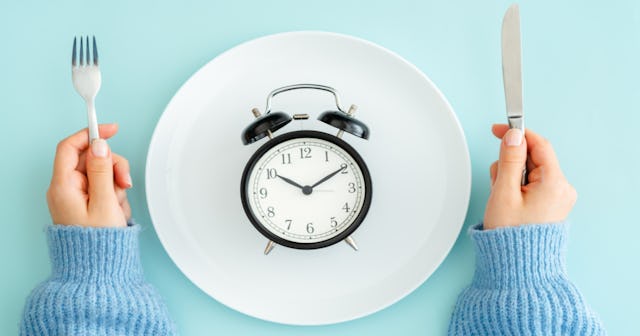No, Fasting Isn't 'Healthy' — It's Disordered Eating

Wellness is everywhere today, or so we believe. From diets and juice cleanses to spirituality and self-care, it is a big, big industry. According to Policy Advice, it’s worth a staggering $4 trillion dollars. But what does the wellness industry sell, aside from ideals and shitty shakes? Well, wellness culture is about promise and potential. Unfortunately, it’s also about weight loss, and one form of weight loss which is currently getting a lot of attention is fasting, particularly after Raven-Symoné revealed it was her “diet” of choice.
“I am low-carb as much as I can be,” the 35 year old said on Good Morning America. “I do very minimal exercise and I am an avid faster. I make sure I have a minimum of a 14-hour fast between dinner and breakfast.”
But is fasting really healthy? While it does have some purported health benefits, fasting is not wellness. Full stop. As Evette Dionne — a journalist and the editor-in-chief of Bitch Magazine — pointed out on Twitter, it’s a form of disordered eating, through and through.
I know what you may be thinking: Disordered eating? That sounds a little harsh. Besides, why should we care about someone else’s dietary decisions? This is Symoné’s life, not ours. And you’re right, at least to a certain degree. The 34-year-old is entitled to carve her own path. She can (and is very capable of) making her own choices. However, fasting is, by definition, restriction. Those who fast limit their intake of calories and food. And any act which involves extreme control and constraint — any diet that requires you to restrict what you eat or when — is “disordered.” It’s just repacked through a “healthy” lens or labeled a “lifestyle” instead.
Dionne went on to explain her reasoning.
“Detoxes are also not a thing people need. Anyone who has a functioning liver has a body that detoxes itself—no additional supplements or drinks needed. I wrote about that a while ago because I needed to. None of this is necessary. None of it.” But that doesn’t mean millions do not try (or buy) into these ideals. I did.
For years, I restricted my calories. I eliminated entire food groups. Proteins. Sugars. Carbs. I tried juice cleanses and liquid diets, and I too played around with timing. I would eat dinner at 6:30pm. No food would cross my lips again until well after noon the following day. Just water and black coffee. I would quell the grumbles and shakes with as much fluid as I could take in, which, by the way, is not “normal.” It is unhealthy, period. And I did all of this to fit an ideal. I bought into the notion that thin was best, no matter the cost.
“Any time you implement strict food rules, be it amounts of foods, types of foods, etc. our bodies will see this as a threat and want to ‘stock up’ on those foods when they can,” Colleen Christensen, a registered dietitian, recently told Scary Mommy. “Binge eating is a common phenomenon that happens. It may also lead to other disordered eating such as orthorexia or severe fear of eating foods outside of set rules. All of this leads to increased stress to the body, which is not beneficial for our health. [Intermittent fasting] commonly leads to weight cycling (losing, regaining, losing, regaining, etc) which has been shown to increase risk for disease.”
Of course, many disagree. According to Harvard Health, proponents of fasting and/or “intermittent fasting regimen[s] claim that it helps shed pounds faster than traditional diets, as well as reduce inflammation and other heart disease risks.”
However, there is simply not enough scientific evidence to support these claims. One study published in JAMA Internal Medicine revealed the benefits of fasting and/or intermittent fasting are minimal, at best. Adults who practiced eating eight hours a day and fasting twelve hours a day for three months had little success.
What’s more, an article on Psychology Today reports that fasting may actually be detrimental to your health.
“Several studies… found an association between delayed eating (i.e., spending many hours during the day without eating) and increased risk of developing episodes of overeating and binge eating.”
So while fasting may seem like a “quick fix” for your weight loss woes, and it may seem easy-peasy and (somewhat) glamorous — it is serious and precarious. Fasting can be dangerous, particularly if you have a history of disordered eating and/or a sordid relationship with your body or food.
This article was originally published on